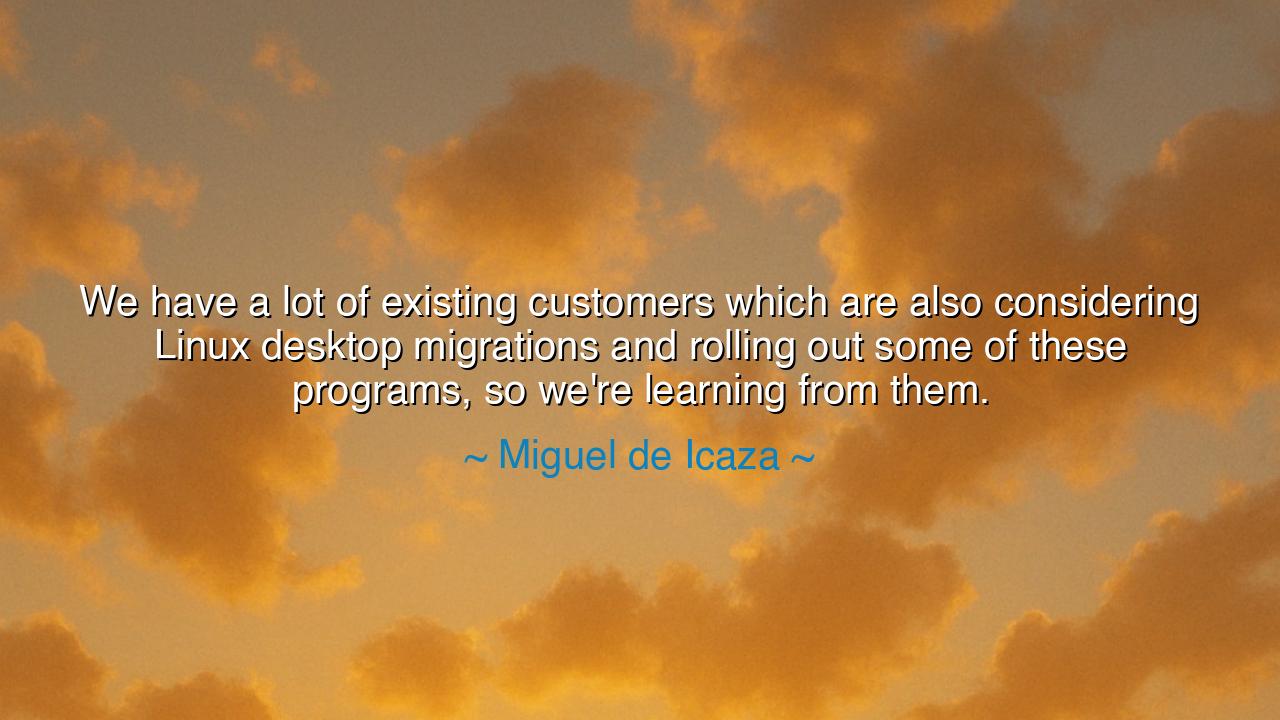
We have a lot of existing customers which are also considering
We have a lot of existing customers which are also considering Linux desktop migrations and rolling out some of these programs, so we're learning from them.






Hear now the words of Miguel de Icaza: “We have a lot of existing customers which are also considering Linux desktop migrations and rolling out some of these programs, so we're learning from them.” At first, these may seem like the words of a craftsman speaking merely of his trade, but look deeper, and you will see wisdom gleaming as gold beneath the surface. For in this utterance lies a truth of enduring weight: that progress is not born in isolation, but through communion with others, through the shared struggles and triumphs of those who walk alongside us.
The mention of existing customers is more than the cold tally of commerce. It is the recognition of fellowship, of companions who journey with us as both teachers and students. They are not passive recipients of tools, but participants in a grand experiment, shaping the path even as they tread it. Here, Icaza reveals the humility of the wise: that even those who create must learn from those who use. To learn from them is to accept that wisdom flows in many directions, that the river of knowledge does not begin and end with the innovator, but is enriched by every hand that touches its waters.
Consider the great transition from the scroll to the codex in the ancient world. For centuries, humanity wrote its knowledge on long, unwieldy rolls of parchment. But when the codex—the bound book—began to spread, it was not the scribes alone who shaped its destiny. It was the readers, the monks, the scholars, the faithful, who discovered its convenience, who demanded its spread, who made it the vessel of wisdom for centuries to come. Thus, invention was not the act of one, but the dialogue between maker and user. Icaza’s words echo this eternal truth: that true innovation comes not from the tower of solitude, but from the chorus of voices in practice.
The phrase Linux desktop migrations speaks of change, of departure from the familiar and the comfortable toward the new and the uncertain. Migration is always a great trial, whether it is the exodus of a people from their homeland or the shifting of communities from one tool to another. Yet, within every migration lies the seed of renewal. Just as the Israelites endured wilderness before reaching their promised land, so too must those who shift from old systems endure challenges, setbacks, and learning. But from this trial arises strength, freedom, and mastery over the tools that shape their world.
Icaza’s vision reminds us also of programs—the living breath of machines, the spirit that animates lifeless hardware. Programs are like the ancient runes carved upon stone, bringing meaning and instruction to the silent matter of the earth. They carry the intent of their makers, yet are transformed by those who use them. To roll out new programs is not merely to deploy tools, but to give birth to possibilities, to unleash powers that can alter the destinies of many. Thus, when communities take up these creations, they do not merely adopt—they transform, and in their transformation, they teach even the creators themselves.
The lesson here is clear: never scorn the wisdom of those who walk beside you. For the farmer learns from his soil, the sailor from the sea, and the builder from the stone. So too must the innovator learn from the customer, the user, the fellow traveler. Humility is the path to greatness, and the refusal to learn is the first step toward ruin. The mightiest empires that fell did so when they ceased to listen, when pride deafened them to the murmurs of their people.
So let us take these words as both inspiration and commandment. In our own lives, let us seek not only to create, but to listen. When we build, let us ask those who will use our work what they need. When we lead, let us hear the voices of those who follow. And when we think ourselves wise, let us remember that wisdom is deepened by the experiences of others. Practical action lies before us: collaborate, share, adapt, and above all, remain teachable.
Thus, in Icaza’s quote we find more than a reflection on Linux or technology. We find a reminder etched in fire: that progress is communal, that learning is eternal, and that to grow is to walk together. Let every generation hold fast to this truth, that the road to mastery is not walked alone, but in the company of many teachers, seen and unseen.






AAdministratorAdministrator
Welcome, honored guests. Please leave a comment, we will respond soon